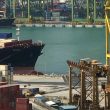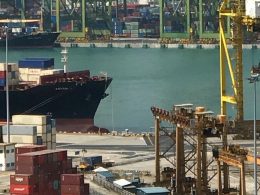Emerging Markets Radar (April 2, 2012)
Strengths
- China’s State Council has provided Wenzhou City a policy to naturalize private lending with new forms of small financial institutions. China is in the process of launching outbound direct-investment channels and setting up regional capital markets to trade non-listed shares, technology and art products over-the-counter.
- Companies in Internet, casino, and banking sectors have mostly beat market estimates so far in the Hong Kong earnings season.
- The Shanghai Shipping Exchanged released data this week showing strong momentum in China’s freight traffic. In addition, Alphaliner reported Maersk halted North Europe-Asia bookings due to a capacity crunch led by skipped sailings in previous months.
- Thailand exports rose 0.91 percent in February, unexpectedly rebounding as factories continue to resume production after last year’s floods. January saw a 6 percent slide in the figure and the median Bloomberg estimate was for a 5 percent contraction. In addition, imports rose 8.25 percent.
- Hong Kong’s February trade growth surprised on the upside. HK exports were up 14 percent and imports 20.8 percent during February, notably better than the consensus expectation.
- Due to extremely low valuation multiples for Chinese companies listed on U.S. exchanges, major shareholders of these companies have come out to buy out these companies. The latest was Zhongpin’s chairman, who offered to buy out the company for about $418 million, or $13.50 per share. The trend may continue if those companies don’t see their multiples re-rated.
- With liquidity and growth fears easing, the Polish Banking Sentiment Index has improved after a 30 percent decline in the fourth quarter, according to Bloomberg. Recent acquisitions by Santander of Kredyt Bank and by Raiffeisen of Polbank, in conjunction with Poland’s underpenetrated banking market and higher growth rates vs. the eurozone, have driven the rebound.
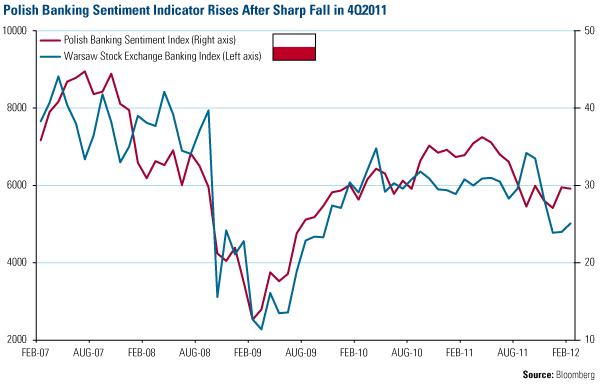
Weaknesses
- South Africa’s economic growth is less than half the level the government says is needed to make inroads into the highest jobless rate of the 61 countries tracked by Bloomberg. At 24 percent unemployment, investors are being pushed to consider alternatives from Australia to Peru.
- The S&P downgraded South Africa’s outlook to negative on structural economic and social problems. The finance minister had listed narrowing the fiscal deficit among his priorities this year, in addition to reducing unemployment and providing moderate tax relief. As rising wages discourage investment, lower revenues will constrain the government’s efforts to meet ambitious goals for job creation.
- January-February profits for industrial companies in China were said to be down 5.2 percent this year versus 25.4 percent increase during this period last year. This raised concerns about a “hard landing,” especially in Hong Kong where sentiment is worsening.
- Recent vegetable prices in China were at historic highs, which may mean the next consumer price inflation (CPI) data may tick higher, reducing the scope for China to relax its currently tight monetary policy.
- The Taiwan government has agreed to put a capital gains tax for stock price appreciation at the top of its agenda. At 3.3 percent of GDP, the Taiwanese government is running the highest budget deficit in Asia and a new source of money is needed.
Opportunities
- Shippers have been able to raise container freight rates this year after removing capacities away from the market. Container liners have been losing money due to a severe freight rate slump following overbuilding in global capacity during the boom-bust cycle. At the current rate, shippers are able to breakeven and may make money if rates and volumes continue to increase.
- Brazil’s central bank President Alexandre Tombini said the country’s labor market can accommodate faster economic growth now that policymakers are forecasting for the second half of the year.
- Russia’s entry into the World Trade Organization (WTO) will add about $162 billion to the country’s economic output each year as market access and foreign investment improves.
- According to Merrill Lynch, the opportunity for active stock pickers to add value in global emerging markets is now increasing (see chart). This performance opportunity refers to dispersion of returns and how large or small the opportunity is between outperforming and underperforming assets. The opportunity to add value from small-sized companies has consistently been higher than the opportunity to do so from large ones.
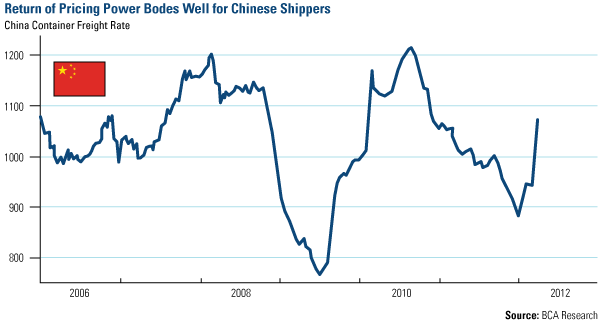
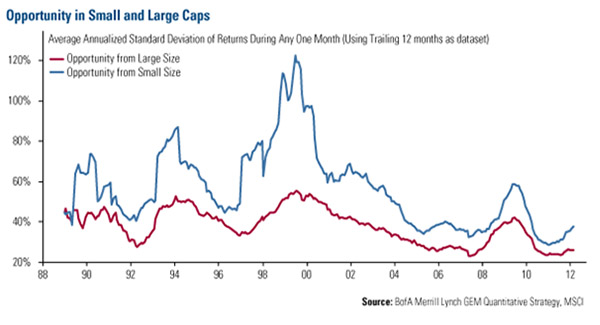
Threats
- Hungary would undermine its credibility by selling eurobonds before obtaining a loan from International Monetary Fund (IMF), the CEO of OTP warned. OTP is the Hungary’s largest bank.
- South Africa’s power supply constraint has the potential to act as a “hand brake” on the country’s GDP growth outlook and is an “underappreciated” downside risk, a domestic banking group warned. In fact, Absa Capital economist Jeffrey Schultz says that the power shortfall is one of the “idiosyncratic” factors that is likely to act as a drag on domestic economic expansion during 2012, as well as over the medium term. It was also a factor in the Barclays affiliate’s decision to revise its GDP outlook downward for 2012.




